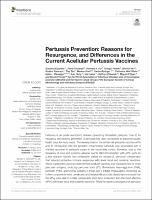| dc.contributor | Vall d'Hebron Barcelona Hospital Campus |
| dc.contributor.author | Esposito, Susanna |
| dc.contributor.author | Stefanelli, Paola |
| dc.contributor.author | Fry, Norman K. |
| dc.contributor.author | Fedele, Giorgio |
| dc.contributor.author | He, Qiushui |
| dc.contributor.author | Paterson, Pauline |
| dc.contributor.author | Rodrigo Gonzalo de Liria, Carlos |
| dc.date.accessioned | 2020-02-07T11:58:36Z |
| dc.date.available | 2020-02-07T11:58:36Z |
| dc.date.issued | 2019-07-03 |
| dc.identifier.citation | Esposito S, Stefanelli P, Fry NK, Fedele G, He Q, Paterson P, et al. Pertussis prevention: Reasons for resurgence, and differences in the current acellular pertussis vaccines. Front Immunol. 2019 Jul;10:1344. |
| dc.identifier.issn | 1664-3224 |
| dc.identifier.uri | https://hdl.handle.net/11351/4599 |
| dc.description | Bordetella pertussis; Whole-cell pertussis vaccine; Pertussis prevention |
| dc.description.abstract | Pertussis is an acute respiratory disease caused by Bordetella pertussis. Due to its frequency and severity, prevention of pertussis has been considered an important public health issue for many years. The development of the whole-cell pertussis vaccine (wPV) and its introduction into the pediatric immunization schedule was associated with a marked reduction in pertussis cases in the vaccinated cohort. However, due to the frequency of local and systemic adverse events after immunization with wPV, work on a less reactive vaccine was undertaken based on isolated B. pertussis components that induced protective immune responses with fewer local and systemic reactions. These component vaccines were termed acellular vaccines and contained one or more pertussis antigens, including pertussis toxin (PT), filamentous haemagglutinin (FHA), pertactin (PRN), and fimbrial proteins 2 (FIM2) and 3 (FIM3). Preparations containing up to five components were developed, and several efficacy trials clearly demonstrated that the aPVs were able to confer comparable short-term protection than the most effective wPVs with fewer local and systemic reactions. There has been a resurgence of pertussis observed in recent years. This paper reports the results of a Consensus Conference organized by the World Association for Infectious Disease and Immunological Disorders (WAidid) on June 22, 2018, in Perugia, Italy, with the goal of evaluating the most important reasons for the pertussis resurgence and the role of different aPVs in this resurgence. |
| dc.language.iso | eng |
| dc.publisher | Frontiers Media |
| dc.relation.ispartofseries | Frontiers in Immunology;10 |
| dc.rights | Attribution-NonCommercial-NoDerivatives 4.0 International |
| dc.rights.uri | http://creativecommons.org/licenses/by-nc-nd/4.0/ |
| dc.source | Scientia |
| dc.subject | Bordetel·la pertússica |
| dc.subject | Tos ferina - Prevenció |
| dc.subject | Vacunes - Desenvolupament |
| dc.subject.mesh | Pertussis Vaccine |
| dc.subject.mesh | Bordetella pertussis |
| dc.subject.mesh | Immunization Programs |
| dc.title | Pertussis prevention: reasons for resurgence, and differences in the current acellular pertussis vaccines |
| dc.type | info:eu-repo/semantics/article |
| dc.identifier.doi | 10.3389/fimmu.2019.01344 |
| dc.subject.decs | vacuna de la tos ferina |
| dc.subject.decs | Bordetella pertussis |
| dc.subject.decs | programas de inmunización |
| dc.relation.publishversion | https://www.frontiersin.org/articles/10.3389/fimmu.2019.01344/full |
| dc.type.version | info:eu-repo/semantics/publishedVersion |
| dc.audience | Professionals |
| dc.contributor.authoraffiliation | [Esposito S] Department of Surgical and Biomedical Sciences, Paediatric Clinic, Università degli Studi di Perugia, Perugia, Italy. [Stefanelli P, Fedele G] Department of Infectious Diseases, Istituto Superiore di Sanità, Rome, Italy. [Fry NK] Immunisation and Countermeasures Division, Public Health England–National Infection Service, London, United Kingdom. [He Q] Institute of Biomedicine, University of Turku, Turku, Finland. Department of Medical Microbiology, Capital Medical University, Beijing, China. [Paterson P] Department of Infectious Disease Epidemiology, The Vaccine Confidence Project TM, London School of Hygiene & Tropical Medicine, London, United Kingdom. [Rodrigo C] Servei de Pediatria, Hospital Universitari Vall d’Hebron, Barcelona, Spain. Hospital Universitari Germans Trias i Pujol, Badalona, Spain. Facultat de Medicina, Universitat Autònoma de Barcelona, Barcelona, Spain. |
| dc.identifier.pmid | 31333640 |
| dc.identifier.wos | 000473564100001 |
| dc.rights.accessrights | info:eu-repo/semantics/openAccess |

